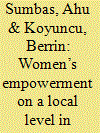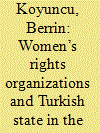| Srl | Item |
| 1 |
ID:
169040


|
|
|
|
|
| Summary/Abstract |
Moving from the assumption that local governments are significant stakeholders of women’s empowerment policies, this article aims to examine the struggle against violence against women (VAW) at the local level through gender-sensitive policies employed by female mayors from a gender perspective and how these can be utilized as collective transformative resources for women’s empowerment. Based on a field-study, the contention of this article is that gender budgeting, gender-sensitive collective-labor contracts, and women’s support centers are institutional resources for the transformation of the municipal-budget, for attitude transformation in male employees, and for sustainable empowerment policies in the struggle against VAW in municipalities in Turkey. This article, stressing the link between the struggle against VAW and women’s empowerment, reveals the significance of institutionalization of gender-sensitive policies and the struggle at local level as two prominent factors taken to be into consideration in women’s empowerment.
|
|
|
|
|
|
|
|
|
|
|
|
|
|
|
|
| 2 |
ID:
169052


|
|
|
|
|
| Summary/Abstract |
In this article, we aim to explore the shift in the relationship between the state and women’s rights organizations (WROs) in Turkey in the post-2011 period, which was evinced in rising tensions between gender equality and gender complementarity discourses. We argue that, in the process of the vernacularization of global and/or international gender norms in Turkey, the conservative gender policy of the government corresponded to the endorsement of ‘gender justice,’ a particularistic approach formulated with reference to Islam. As such, the vernacularization of universal gender norms opened the way for the state in Turkey to solidify its legitimacy by instrumentalizing social divisions, marginalizing opposition WROs, and aligning with government-oriented organizations.
|
|
|
|
|
|
|
|
|
|
|
|
|
|
|
|